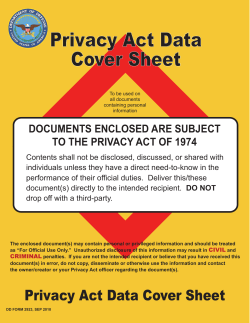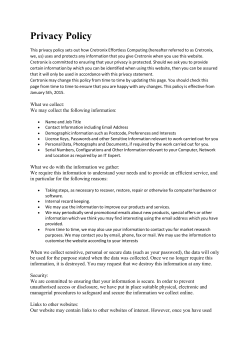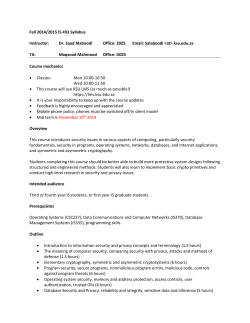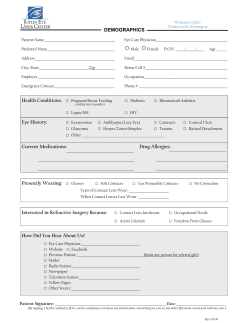
Privacy and the Public Records Act
Privacy and the Public Records Act By Nigel S. Malden Attorney At Law 711 Court A, Suite 114 Tacoma, WA 98402 nm@nigelmaldenlaw.com ©Nigel Malden March 2015 Disclaimer These materials are intended to provide general information only, and not legal advice. Laws and court rulings discussed herein may be subject to amendment, interpretation, or change over time. i Privacy & the Public Records Act Our state and federal constitutions call for open government. This means the public must have the right to inspect government records. This right to inspect records kept by government entities and agencies is set forth in the Public Records Act (PRA).1 A. PRA Purpose and Procedure The PRA is designed to give the public broad, unfettered access to nonexempt public records because free and open examination of public records is in the public interest even if such examination “may cause inconvenience or embarrassment to public officials or others."2 When a public entity is served with a PRA request for records, it must determine whether any of the records requested are exempt from disclosure. The PRA exempts from disclosure any material that would invade a person’s right to privacy.3 Specifically, RCW 42.56.230(3) exempts disclosure of personal information in files maintained for employees of any public agency “to the extent that disclosure would violate their right to privacy," and RCW 42.56.240(1) exempts from disclosure certain investigative records when necessary “to protect any person's right to privacy.” Under these RCWs, a person's right to privacy is invaded only if the disclosure of information about the person: (1) Would likely be highly offensive to a reasonable person; and (2) is not of legitimate concern to the public.4 The public entity must give timely notice if any record is withheld under a claim of privacy or other exemption. If the party requesting production is dissatisfied with the response, 1 RCW Chapter 42.56. RCW 42.56.550(3); see also Neighborhood Alliance of Spokane County v. Spokane County, 172 Wn.2d. 702, 714715 (2011).” We interpret the PRA in light of the principle that full access to information concerning the conduct of every level of government is a fundamental and necessary precondition to the sound governance of a free society.” 3 The PRA sets forth several categories of exemptions but this article only discusses those relating to privacy. 4 RCW 42.56.050. (This is the same standard used to determine invasion of privacy under common law). 2 1 he may file suit and seek a court order compelling production. If the requesting party prevails, he may seek an award of attorneys’ fees and monetary penalties.5 B. What is Highly Offensive to Reasonable Person? In general, the right to privacy only applies to “the intimate details of one's personal and private life." Dawson v. Dailey, 120 Wash.2d 782, 796 (1993). Whether the disclosure of such details would be “highly offensive” in a particular case, must be judged from the perspective of an ordinary person. As the following cases illustrate, however, whether something is “highly offensive” is not exactly a bright line test. In Seattle Firefighters v. Hollister, 48Wn.App.129 (1987), a private researcher asked the state Department of Retirement Systems for the disability records of several retired fire fighters and police officers because she was conducting a nationwide study of public disability retirement systems. The firefighters’ union obtained an injunction in King County Superior Court barring the production of several records on the grounds they contained private medical histories including references to back injury, asthma, emphysema, ulcers, and arterial problems. The appellate court quashed the injunction because none of the medical conditions at issue were deemed “unpleasant, disgraceful, or humiliating illnesses” that would be “highly offensive to reasonable people.”6 In Spokane Police Guild v. Washington State Liquor Control Bd., 112 Wn.2d 30 (1989), the state liquor control board investigated a “stag and strip show” attended by off duty police officers. The agency concluded that one of the performer’s dances had violated state liquor 5 The PRA entitles a prevailing party in an action “seeking the right to inspect or copy any public record or the right to receive a response to a public record request” to costs and attorneys fees. RCW 42.56.550(4). The trial court may also impose per diem monetary penalties for wrongful withholding of documents using a multifactor test. Yousoufian v. Office of Ron Sims, 168 Wn.2d 444, 467 (2010). 6 But see, White v Town of Winthrop, 128 Wn. App. 588 (Div 3 2005)(appellate court ruled that a trial was required to determine whether the disclosure of details regarding the employee’s seizure disorder would be “highly offensive” to an ordinary person. 2 control regulations. A newspaper requested a copy of the investigative report under the PRA. The agency announced that it would release the report unless someone obtained an injunction ordering otherwise. The police guild filed suit in Spokane Superior Court seeking to enjoin production of the report on various grounds including invasion of privacy under RCW 42.56.230(3). The trial court denied the injunction and the guild appealed to the Washington State Supreme Court. The court began its analysis by emphasizing that “full access to information concerning the conduct of government on every level must be assured as a fundamental and necessary precondition to the sound governance of a free society.” The court then explained that the right to privacy under the PRA typically covers “the intimate details of one’s personal and private life,” but not alcohol fueled “antics before 40 or more people on premises licensed by the state Liquor Control Board.” C. What is of Legitimate Public Concern? In Allen Martin v. Riverside School District No. 416, 180 Wn. App. 28 (Div. 3 2014), a newspaper asked a school district to produce all records relating to its termination of a former teacher under the PRA. The teacher admitted to a sexual encounter with a former student in his classroom but denied any technical misconduct because the woman was over 18 and the incident occurred when the school building was officially closed for a holiday weekend.7 The school district notified Martin that it would release its investigative report as requested unless a court ruled otherwise. The trial court’s denial of Martin’s request for an injunction was upheld on appeal. The appellate court acknowledged that disclosing the name of a teacher accused of sexual misconduct could be “highly offensive.” The court reasoned, 7 The school district responded by firing Mr. Martin for inappropriate use of school facilities. 3 however, that if the accusations were substantiated, then the investigation was of clear legitimate concern to the public and the records were not exempt from disclosure under the PRA. In Tiberino v. Spokane County Office of the Prosecuting Attorney, 103 Wn. App. 680 (Div 3 2000), a legal secretary was terminated by the Spokane County Prosecutor’s Office for sending over 400 personal emails to friends and family after being warned such communications were being monitored and were not private. After the termination, a newspaper asked the prosecutor’s office to produce all of the emails under the PRA. The prosecutor’s office agreed to produce them unless Tiberino got an injunction. Tiberino got the injunction. As it turned out, she was fired thirty days after reporting a sexual assault to her employer. The 400+ emails were all sent within 40 days following the assault. Tiberino was obviously in grave distress and her emails revealed personal and intimate details about the attack and its psychological consequences. The court barred Tiberino’s ex-employer from producing the emails because the material was highly personal, unrelated to government operations, and “any reasonable person would find its disclosure to be highly offensive.” Furthermore, “the basic purpose and policy of the PRA is to allow public scrutiny of government, (not) promote scrutiny of particular individuals who are unrelated to any government operation.” In Spokane Research and Defense Fund v. City of Spokane, 99 Wn. App. 452 (Div.3 2000), the City of Spokane received a PRA request for the City Manager’s annual performance reviews. The city denied the request on the grounds that employee performance reviews are covered by the privacy exemption in RCW 42.17.310(1)(b). The reviewing court noted that public employee performance evaluations are usually exempt from public disclosure because both the supervisor and the employee reasonably expect 4 confidentiality and the legitimate public interest in such material is usually limited. However, the expectations and the rules are different when the employee at issue is a public figure and the city’s chief executive officer. In such cases, the employee cannot reasonably expect his performance reviews to be private and exempt from disclosure. In Bellevue John Does 1-11 v. Bellevue Sch. Dist. No. 405, 164 Wn.2d. 199 (2008), a newspaper filed a PRA request with the Bellevue school district for all complaints lodged against all teachers for sexual misconduct. The request did not distinguish between accusations or complaints that were substantiated following investigation and those that were not. The school district notified its teachers that it would release the records as requested unless someone obtained an injunction. A group of the teachers sought the injunction in King County Superior Court. All teachers in the group faced charges of sexual misconduct that were investigated but never substantiated. They argued that releasing their names along with unsubstantiated complaints would damage their names and reputations and violate their right to privacy. The Washington State Supreme Court agreed and clarified the applicable rules: (1) when a complaint regarding misconduct during the course of public employment is substantiated or results in some sort of discipline, then an employee does not have a right to privacy in the complaint; (2) however, when an allegation of misconduct is unsubstantiated, then the teacher’s identity is not a matter of legitimate public concern; (3) when a document does not detail the unsubstantiated misconduct and a teacher is not disciplined or subject to any restriction, then his or her name should be redacted before 5 disclosure. This protects the public interest in overseeing the school district’s response to misconduct allegations and the teacher’s individual right to privacy.8 8 164 Wn.2d at 803-804. If someone requests the records of a specific individual under the PRA and receives a set of documents back, the target’s identity may be ascertained regardless of redaction. The courts have responded by stating that “nonexempt information in a record must be produced even if disclosure would result in inability to protect the identity of an individual.” Predisik v. Spokane School District No. 81, 179 Wn.App. 513 (Div. 3, 2014). 6
© Copyright 2025











